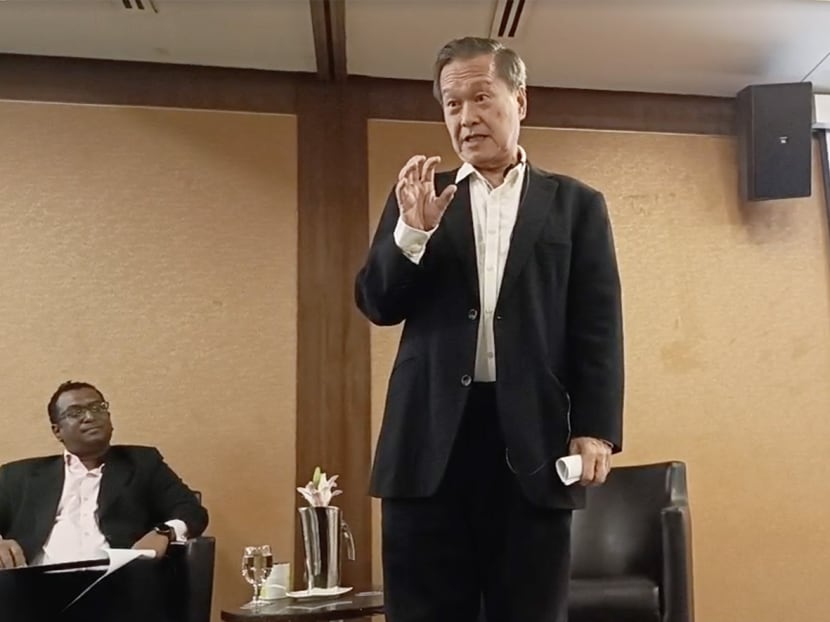PE 2023: Elected presidency an 'unproductive exercise', S'pore should go back to appointing president again, says Tan Kin Lian
SINGAPORE — Presidential candidate Tan Kin Lian believes that the process of a presidential election in Singapore is an “unproductive exercise” and that the country should go back to a system of an appointed presidency.

Presidential hopeful Tan Kin Lian speaking at a members-only event organised by the National University of Singapore Society on Aug 26.
- Presidential candidate Tan Kin Lian believes that the process of a presidential election in Singapore is an “unproductive exercise” and that the country should go back to a system of an appointed presidency
- Regarding the President's power to grant clemency to prisoners on death row, Mr Tan said he believes the country can be more “merciful” in its treatment of such individuals
- He added that he would “prefer” for the exact figure in Singapore’s reserves to be revealed to the public, as he believes the chances over a foreign attack on the Singapore dollar are “quite small”
- Mr Tan also said that he holds a "different opinion from the majority of Singaporeans" on the Ridout Road saga, and he would issue a Commission of Inquiry (COI) if there was a public outcry on the matter
SINGAPORE — Presidential candidate Tan Kin Lian believes that the process of a presidential election in Singapore is an “unproductive exercise” and that the country should go back to a system of an appointed presidency.
“I think it might happen that we’ll go back to the old system where the Parliament will appoint the President. We spend so much time to elect a President, then we end up telling the President that ‘these are the things you cannot do’,” he said on Saturday (Aug 26) at a members-only event organised by the National University of Singapore Society (NUSS).
“I got a lot of notices about what I cannot do — so I think it’s quite an unproductive exercise. So I think we should change, and the Government is probably thinking about that.”
The former chief of NTUC Income said this in response to a question by an audience member on whether Mr Tan could "change the rules" of the eligibility of future presidential candidates if he were elected.
Throughout his campaigning, Mr Tan has repeatedly spoken about issues beyond the remit of the president including bringing down the cost of living and having the power as President to set the investment policy for the country's sovereign wealth funds.
Analysts have repeatedly pointed out that matters pertaining to policy-making are not under the purview of the President.
On Saturday, Mr Tan also answered a myriad of questions, after delivering a 20-minute speech, including questions on the Council of Presidential Advisers, the Ridout Road saga, and his intended use of the nation's reserves during the 1.5 hour event .
The event, which was attended by about 90 people, was held at the NUSS Kent Ridge Guild House. His presidential rival Ng Kok Song took part in a similar dialogue organised by NUSS on Friday.
The third candidate, Mr Tharman Shanmugaratnam also held an event on Friday where he spoke to 650 public guests at an election meeting organised by his campaign team at Pasir Panjang Power Station.
COUNCIL OF PRESIDENTIAL ADVISORS SHOULD BE FREE OF 'PARTY POLITICS'
Mr Tan also responded to a question from an audience member on whether the President’s role was essentially “powerless” due to the composition of the eight-member Council of Presidential Advisers (CPA).
To this, Mr Tan said the issue was “very complicated”, given how council members are chosen.
Of the eight members council, three are appointed at the discretion of the President, another three are nominated by the Prime Minister, one is nominated by the Chief Justice and one member is nominated by the chairman of the Public Service Commission.
“This is one of the reasons why I think it’s better to go back to the old system where President Wee Kim Wee was appointed by the Parliament, rather than go into this election.
“It’ll be better for Singapore if we don’t have this complicated system. No matter what we do, there will be a lot of problems with the current elected president system,” he said.
Mr Tan did not elaborate on what these problems were or how the matter was complicated, but emphasised that discussions with the CPA should be free of “party politics”.
“It doesn’t matter who got more power (sic). I think it should not be party politics… it’s a question of what decision would be good on a whole for the people.
“It shouldn’t be decided by ‘are you on the prime minister’s side or are you on the president’s side’... The right arrangement should be ‘here are eight people who are supposed to be very capable people, who sit down and look at a problem and find out what is the best solution," he said.
S'PORE SHOULD BE ‘MERCIFUL’ REGARDING THE DEATH PENALTY
During the session, Mr Tan also brought up the power of the President to grant clemency to prisoners on death row for drug-related offences when asked if the President was "powerless".
He said he believes the country can be more “merciful” in its treatment of such individuals.
“Personally, when I see the people that went for hanging, many of them come from very poor families… and quite often they are not aware, they were just tricked,” he said.
“Of course the worry of the people who advise the cabinet is 'if you let go one, then everybody will come'. I don’t believe that.
“I think it is okay to be merciful and if this becomes a problem, and there is a big influx of trafficking, then you have to be more strict,” he said.
However, he acknowledged that he would not be able to grant clemency to persons on death row if the Cabinet does not heed his advice.
“The law is quite clear. The President must follow the decision of the Cabinet. When the case comes, before the Cabinet gives the President advice, I as the President will give the Cabinet my advice.
“And if the Cabinet decides against me, which they have the power to do, it will not be so respectful. And I ask the Cabinet to respect the president,” he said.
Associate Professor Eugene Tan of Singapore Management University (SMU) said that while the President can give his views on the death penalty in a private and confidential discussion between him and the government, he has "absolutely no discretion in a clemency application".
"Where there is a clemency application, there is no legal or even ethical basis for the president to offer his 'advice' before the Cabinet does. If elected, he will never be able to do what he claims he would do," he said.
Agreeing, political analyst at the Nanyang Technological University (NTU) Felix Tan said that the presidential hopeful's statement could be perceived as meant to "tug on the emotional heartstrings of a certain group of individuals".
CONCERNS OVER FOREIGN ATTACK ON S'PORE DOLLAR IS 'QUITE SMALL'
Asked whether he agreed about the proportion of the Net Investment Returns Contribution (NIRC) that are apportioned to the reserves, Mr Tan said that as President, he would not be able to impose his views because “the authority is with the Finance Minister and the Cabinet”, and that the people should “respect” their decisions.
“It's quite complicated. It is something you must respect the Finance Minister and his team of people. They make that decision. Ordinary people who don't know enough about the subject should not try to say we must do something else,” he said.
However, he added that the NIRC and other systems like the Central Provident Fund system are “messy” and “should be restructured”, and said he had suggestions on how to do so which he would pass on to the Prime Minister if elected.
When asked a question on how he intends to safeguard the reserves and ensure that it is used for the benefit of Singaporeans, Mr Tan responded that he would “prefer” for the exact figure in Singapore’s reserves to be revealed to the public, adding that he believes the chances over a foreign attack on the Singapore dollar are “quite small”.
Dr Tan of NTU said that Mr Tan's comments on the reserves were "speculative", and would perpetuate an "unfair" belief that the Government is hiding something.
Assoc Prof Tan of SMU added that the comments "trivialise the real possibility of a sustained attack on the Singapore dollar", and that it is a "known method of 'warfare' to create economic uncertainty and bring a country to its knees".
ON THE RIDOUT ROAD SAGA
The topic of the Ridout Road saga — in which Minister for Foreign Affairs Vivian Balakrishnan and Minister for Law and Home Affairs K. Shanmugam were investigated by and subsequently cleared by the Corrupt Practices Investigation Bureau of any wrongdoing — also surfaced at the dialogue.
A member of the audience asked the presidential hopeful if he would issue a Commission of Inquiry (COI) on the matter.
To this, Mr Tan said he would first need to consult a constitutional lawyer to find out if he had the power to issue such a COI but added that he held what he believes to be a "different opinion from the majority of Singaporeans" on the matter.
“If the Singapore Land Authority (SLA) says 'Mr. Tan, we want to rent out 26 Ridout Road to you for S$26,000 a month', I will tell the SLA ‘thank you very much. I'm not interested’. I don't want the trouble of looking after the large piece of land," he said.
“In fact, those two properties — nobody (was) interested for many years."
He added however that if there was a public outcry on the matter, he would call for a COI if it was within his purview.
"If there's a big public outcry, and many people say let's go and call a COI, I will do it. But if they ask my personal opinion, I say let's be fair. I don't know who wants the Ridout bungalow for S$26,000. I don't think many people are interested.”
According to Assoc Prof Tan of SMU, however, the president has no independent power to appoint a COI of its own volition.
"The president’s powers under the Inquiries Act is, in my view, subject to Article 21(1) of the Constitution which states that unless provided by the Constitution, the President 'shall, in the exercise of his functions under this Constitution or any other written law, act in accordance with the advice of the Cabinet or of a Minister acting under the general authority of the Cabinet'."











